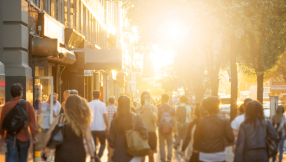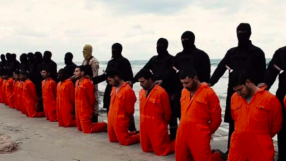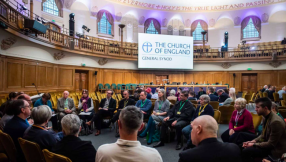The Church of England's parliamentary body has apologised for racism experienced by the Windrush and subsequent generations of minority ethnic people.
A motion passed unanimously by the General Synod on Wednesday offers a "lament, on behalf of Christ's Church, and apologises for, the conscious and unconscious racism experienced by countless black, Asian and minority ethnic (BAME) Anglicans in 1948 and subsequent years, when seeking to find a spiritual home in their local Church of England parish churches, the memory of which is still painful to committed Anglicans who, in spite of this racism from clergy and others, have remained faithful to the Church of England and their Anglican heritage".
It expresses "gratitude to God" for the "indispensable" contribution made by black, Asian and minority ethnic (BAME) Anglicans, and recommits the Church of England to stamping out racism.
In doing so, the Church of England will "resolve to continue, with great effort and urgency, to stamp out all forms of conscious or unconscious racism" and commit "to increase the participation and representation of lay and ordained BAME Anglicans throughout Church life".
In an unusual move, Synod paused for a moment of silence after hearing about the appalling experience of the parents and sibling of Southwark Diocese parishioner Doreen Browne, who in 1961 were barred from entering St Peter's Church in Walworth, south London.
Sharing their story, Father Andrew Moughtin-Mumby, from Southwark Diocese, said the reason for not letting them in was "due to the plain fact of the colour of their black skin".
"They eventually found a home in a nearby parish church - but we know that many cradle Anglicans from the Caribbean did not, and simply left the Church of England: that is a scandal of our own," he said.
"Doreen's family suffered a horrible, humiliating racism which still affects Doreen's relationship with the Church even today."
He added: "Any apology that we, the Church, can give, must lead to urgent change in our Church; concrete change. And this is not just about the Church's past."
Responding to his comments, the Archbishop of Canterbury Justin Welby said there was "no doubt" that the Church of England was still "deeply institutionally racist".
He added that he was "sorry" and "ashamed" to hear about Browne's experience.
"We did not do justice in the past, we do not do justice now, and unless we are radical and decisive in this area in the future, we will still be having this conversation in 20 years time and still doing injustice - the few of us that remain, deservedly," he said.
"We have damaged the Church, we have damaged the image of God and most of all, we have damaged those we victimised, unconsciously very often."
The Bishop of Newcastle, Christine Hardman, offering a prayer for all those who have experienced racism in the Church of England, said: "We pray for all who have suffered from the evil of racism and discrimination, we pray for those who were deported this morning and, for ourselves, we offer our profound sadness at our sinfulness and we ask for forgiveness."
She was referring to 17 people deported to Jamaica by the Home Office on Tuesday morning. The plane was supposed to carry up to 50 Jamaican nationals but left with a smaller number after a successful legal challenge.
Speaking during the Synod debate, the Bishop of Leicester, Martyn Snow, said that the warm welcome he had received from churches across the world stood in contrast to the reception experienced by the Windrush generation in Britain.
"All at sea culturally, they turned to the one place they thought they would be welcomed and offered hospitality, only to find they were shunned," he said.
"So, to those who say, how can we apologise for the actions of a previous generation – I say, this is not just about previous generations – the impact continues today."













